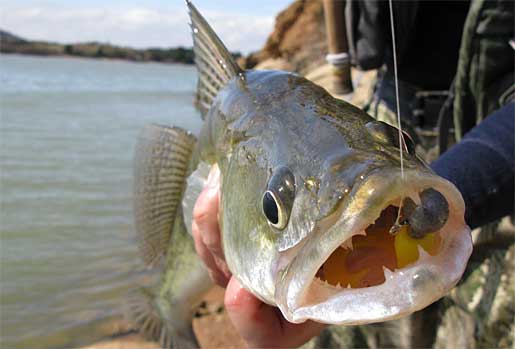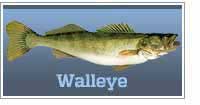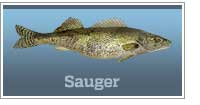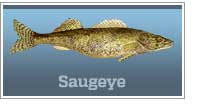Walleye, Sauger & Saugeye Fishing In North Dakota
Fish For Walleye, Sauger & Saugeye
Best Walleye Fishing In North Dakota
Catch More Walleye

Walleye are well known for their delicious white meat, and rank among the most sought-after freshwater-fish species. Understanding the behavior and preferences of these elusive fish in North Dakota is key to unlocking their secrets and catching more walleye.
Walleye fishing basics video
How To Fish For Walleye In North Dakota
For starters, focus on the fact that walleye move about the lake in search of two things. First and foremost, they follow their food source of baitfish and other small fish. Second, walleye relate to structure whether that be points, rock outcroppings, drop-offs or flats at their preferred depth for the season. Generally speaking, walleye can be found in the 10 to 40-foot range, depending on the particular body of water and time of year. Identify the preferred depth on the day you are fishing, and you can now look for potential structure at that depth. A fish finder can help locate the fish, structure and baitfish much more quickly.
Best Lakes For Catching North Dakota Walleye
Although there are many good choices for walleye destinations in North Dakota, Lake Oahe, Devils Lake and Lake Sakakawea have been, and continue to be, among the top producers over the years.
Best Tackle For Walleyes Fishing In North Dakota
Whether you prefer spinning reels, which are popular with many walleye anglers, or baitcasting reels, be sure to use a quality fishing rod. Medium or medium-heavy action rods in the seven-foot range tend to be ideal. Sensitivity is crucial, so spend a little extra and you'll feel more of the soft bite’s walleye are notorious for. Most rod manufacturer offer rods specifically designed for walleye fishing. Spool your reel with 8-to-12-pound monofilament, fluorocarbon or braided line, depending on the size and types of bait you plan to use. When using braid, add a monofilament or fluorocarbon leader.
Best Baits For Catching Walleye
How To Catch Walleye With Jigs
Jigs are a top choice among many seasoned walleye enthusiasts. Select jig heads in 1/8 to 1/2-ounce range. Use lighter weights for slow fishing when no current is present, heaver jigs for actively feeding walleye, in windy conditions or when dealing with current. Plastics or hair jigs are both good options.
How To Catch Walleye With Crankbaits
Crankbaits come in all sorts of colors and actions, each designed to run in a specific depth range. They can be cast and retrieved or trolled behind the boat. At times, bright, flashy colors entice strikes. Other times subdued colors and actions are more appealing. Experiment to find the best combination for the fish on your day of fishing. Using leaded line for trolling can get crankbaits and jerkbaits to run deeper than normal.
How To Catch Walleye With Minnows
Minnows of all kinds including shiners and fatheads can be fished on a hair jig or an open-hook jig. Still fishing or slow drifting with, or without, a bobber can be productive.
How To Catch Walleye With Nightcrawlers
Nightcrawlers are a staple for catching walleye. The fish love them and they are easy to get and keep fresh. These worms too, can be fished on a hair jig, an open-hook jig or as a trailer behind a spinner. Still fishing or slow drifting with, or without, a bobber are popular tactics for walleye.
How To Catch Walleye With Spinners
Spinners can be trolled or cast and work well with or without any bait enhancement. At times adding worms or minnows can further entice strikes.
How To Catch Walleye With Spoons & Blade Baits
Spoons and blade baits can be fished vertically under the boat, or by cast and retrieve. Lifting the lure and letting it fall like an injured baitfish is the trick to fooling walleye into taking the bait.
Fishing For Walleyes By Season
North Dakota Spring Walleye Fishing
Top Baits: Shallow crankbaits, small jigs and spinners.
Fish shallow to moderate depths as the walleye move into the shallows to spawn. Gravel ledges, points and submerged humps in protected areas are prime holding areas. During this period, walleye exhibit a strong inclination to migrate from their usual haunts in lakes, to feeder streams or rivers for spawning purposes. However, in instances where such migratory routes are unavailable, walleye will seek out alternative spawning grounds. Shallow bars or shoals with clean, gravelly bottoms, situated in close proximity to deeper waters, become prime locations for the walleye spawn.
North Dakota Summer Walleye Fishing
Top Baits: Crankbaits, jigs, nightcrawlers and jigging spoons.
Fish shallower in the mornings and evenings and move deeper as the sun rises. Use lures that mimic small baitfish or sunfish as these are a favorite food of the walleye. Follow points and rocky or gravel structure deeper until you establish the proper walleye holding depth. Night fishing for walleye in summer can be very effective. Often, bright colors attract walleye, especially when they are aggressive. Other times try colors that closely match the prey they feed upon in your local water.
North Dakota Fall Fishing For Walleye
Top Baits: Blade baits, jigs, nightcrawlers and jigging spoons.
In fall, walleye follow schools of baitfish into feeder creeks where they tend to hold at medium depths. Creek channels, flats and ledges are popular holding places at this time. Lures mimicking baitfish often work best during this short season.
North Dakota Winter Fishing For Walleye
Top Baits: Jigs, spoons and ice jigs.
If local lakes freeze over in winter, see the North Dakota ice fishing page for potential lakes and ice fishing tips. For lakes that do not freeze over, walleyes will be found in similar areas as in summer, typically around deep structure. Use summer fishing techniques, but slow down the presentation as the cold water makes fish sluggish.
Best Techniques For Fishing For Walleyes
Walleye Fishing Tips For North Dakota
First and foremost, learn about the lake or body of water you intend to fish. Review maps to locate potential structure at a variety of levels, read fishing reports and talk to local bait and tackle shops. Gather as much information as possible before heading off on your walleye fishing trip.
In addition to lure selection, mastering the art of presentation is essential for success in walleye fishing. Walleyes are known for their keen sense of sight and can be particularly discerning when it comes to bait presentation. Utilizing subtle movements or even erratic actions to mimic the behavior of injured prey can often provoke a predatory response from walleye. Slow, methodical retrieves are often effective in enticing sluggish walleye, especially during periods of low light or inclement weather conditions. Conversely, aggressive jigging or rapid trolling speeds can trigger reactionary strikes from walleye in more active feeding modes.
Fishing For Sauger In North Dakota
Sauger is an excellent eating fish which typically runs a bit smaller than its cousin the walleye. The sauger prefers cold and often cloudy, moving water. They spawn in the low to mid 40s. You can tell them from a walleye by the dark spotting on the dorsal fin, darker coloring and the rough covering of the gill area. To fish for sauger, use the same methods, tackle, lures and bait as listed above for walleyes. When the water turns cold and other fish are hard to come by, this is the time to fish for sauger. Fish with jigs, spoons and crankbaits imitating crayfish or baitfish. Fish near the bottom and experiment with presentation action and speed.
Fishing For Saugeye In North Dakota
This hybrid (walleye/sauger) successfully inhabits waters where the walleye sometimes struggles. Look for them near bottom on sandy bars and particularly along drop offs and river channels. To fish for saugeye, use similar methods, tackle, lures and bait as listed above for walleye. Choose smaller crankbaits that resemble minnows, shad or small crappies. Fish is their primary food source.
Best Walleye, Sauger & Saugeye Lakes In The State
Fishermen in ND are quite fortunate to have excellent walleye throughout the state. Major lakes including Arrowwood Lake, Bowman-Haley Lake, Buffalo Lodge Lake, Devils Lake, Dry Lake, Jamestown Reservoir, Lake Ashtabula, Lake Audubon, Lake Darling, Lake Metigoshe, Lake Oahe, Lake Sakakawea, Lake Tschida, Pipestem Lake, Stump Lake and the Missouri River all have healthy populations of walleye. Ice fishing for walleye is popular on many of these waters in winter. Many rivers flowing into or out of these lakes may also have walleye.
Fishing for walleye in North Dakota
Walleye
World record: 25 lbs 0 oz
State Record: 15 lbs 13 oz
Sauger
World record: 17 lbs 7 oz
State Record: 8 lbs 12 oz
Saugeye
World record: 15 lbs 6 oz
State Record: 12 lbs 0 oz
Click the images and links above for species details.
Top lures for walleye, sauger and saugeye in North Dakota this year
Jigs with a variety of trailers and bait work well in virtually any depth water. When walleyes are shallow, spinnerbaits, small crankbaits and rip baits are the often very productive. Jigs and ice jigs are very productive when ice fishing. As they move deeper, spoons are ideal for active walleye. Understanding the seasonal movements of walleye improves your odds of selecting the right lures for conditions on local waters.
North Dakota State Walleye, Sauger & Saugeye Records
The state record walleye was caught out of the Missouri River.
The state record sauger came from Lake Sakakawea.
The state record saugeye was taken out of the Yellowstone River.
Walleye Resources
In-Fisherman - Walleye
U.S. Fish & Wildlife - Walleye
The National Wildlife Federation - Walleye
Find information about walleye, sauger or saugeye fishing in these states
090424
NORTH DAKOTA









